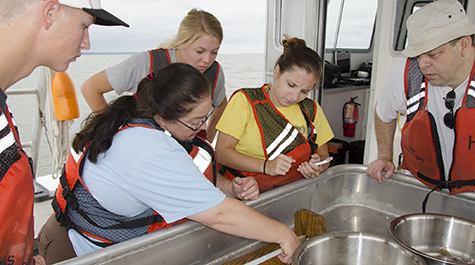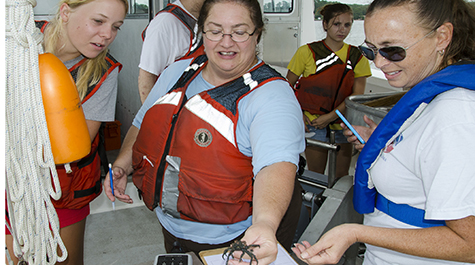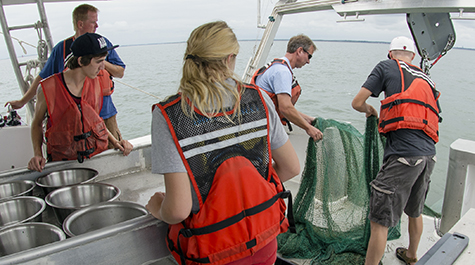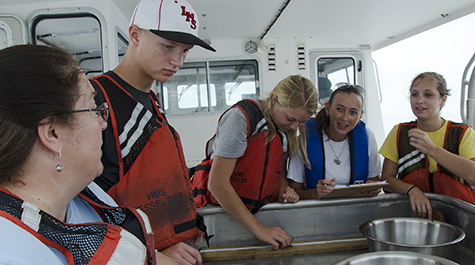VIMS partners with community college to offer “hybrid” course
A unique partnership between the Virginia Institute of Marine Science and Rappahannock Community College combined online academics with wet and muddy fieldwork to help RCC students learn about the interactions among organisms in coastal environments.
Offered by RCC, the Coastal Ecology course came to an end last week. Taught by VIMS alumna and RCC Adjunct Professor Diane Tulipani, the five-week computer-based course was enriched by two days aboard VIMS’ newest research vessel, the R/V Tidewater, as well as several days in a lab on VIMS’ main campus in Gloucester Point.
RCC Biology Instructor Lisa Tuckey co-developed the course with Tulipani and says the pair worked together to create a blend of online learning and hands-on field and lab experiences that provide students with a first-class transfer biology course.
“We have many students who are interested in science as a possible transfer major when they leave RCC,” says Tuckey. “We thought this course would provide an excellent opportunity for students thinking about marine science or biology as a college major, especially since it focuses on our local environment.”
The six students enrolled in the course investigated beaches, salt marshes, and estuarine ecosystems, with a focus on how chemical, geological, and physical factors affect the distribution of organisms. They also explored how pollution and human manipulations affect the shoreline.
Tulipani, a recent graduate of the Ph.D. program in William and Mary’s School of Marine Science at VIMS, was chosen to teach the course by Tuckey and RCC’s Academic Dean Patricia Mullins based on her educational background, experience, and knowledge of marine ecology. For her doctoral research, Tulipani studied foraging by diamondback terrapins and its effect on the ecology of local marshes and seagrass beds.
Since graduating from VIMS, Tulipani has been teaching introductory biology lectures and labs at RCC’s Glenns campus. Her lectures often feature an interactive video component that allows students to connect to the lecture in real-time between RCC’s Glenns and Warsaw campuses.
While she most enjoys teaching her classes in person, Tulipani says the “hybrid” model of combining online and in-person instruction is fairly easy to implement given all of the marine-oriented resources that can be found on the web. “I’m glad the course was considered a field course because—though the majority of it took place online—it allowed students the opportunity for hands-on learning,” she says.
The students complemented their online work by visiting several different coastal habitats along the York River, where they observed and identified plants and animals while also gaining the skills needed to determine the water’s salinity, temperature, and organic content. By later analyzing collected samples in a lab at VIMS, the students obtained data on the overall health of the York River ecosystem and gained a greater appreciation of the water-quality challenges that hamper sustainable use of Chesapeake Bay resources.
“The students sampled at two upriver stations and two stations at the mouth of the York,” says Tulipani. “At each station, we did a 5-minute trawl to collect a variety of species of fish so the students could identify, count, and measure them. They also completed a plankton tow.”
Tuckey says the overall experience was great for both students and instructors. “The VIMS faculty, staff, facilities, and boat crew were wonderful to work with, and they provided an excellent learning experience for the RCC students,” she says. “We’re very appreciative of everything that VIMS did to make this partnership a one-of-a-kind opportunity in Virginia.”
Lyndsay Thomas, one of the students enrolled in the course, says she enjoyed it immensely. “Hopefully VIMS will offer future educational opportunities for RCC students to take part in,” she says.
“Partnering with VIMS was the perfect way to expose RCC students to a possible major or career,” adds Tuckey. “We also hope it led students to consider VIMS as an educational choice in their future.”
“We’re so happy to have been able to offer the students at RCC a place to complete field and lab work that is essential to their understanding of coastal ecology,” says VIMS Associate Dean of Academic Studies Linda Schaffner. “We’re hoping to continue to partner with local community colleges to offer students unique and collaborative educational experiences.”
Tulipani says her time at VIMS helped prepare her to teach courses like this one. “VIMS provided me with the chance to learn about all aspects of marine science—biological, chemical, physical, and geological—and how it’s all vital to understanding the marine environment,” she says





